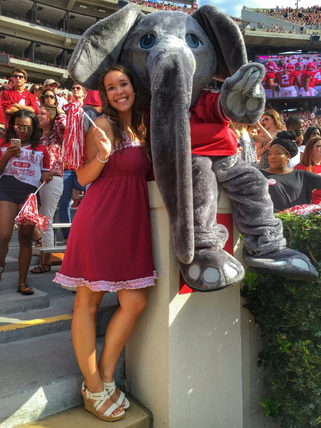 By Mackenzie Sower The African Elephant Project It’s Saturday down south during the fall and everyone knows what that means… football. Walking through The Quad on The University of Alabama’s campus is a sight to be seen on game day. While mazing through the people and tailgate tents, the aroma of BBQ fills the air. People shout “Roll Tide!” from all over and the Million Dollar Band is playing. Nothing can compare to the ambiance. However, by 2025, all of it could be changed. Big Al, The Capstone’s official mascot, is of the African Elephant species. He attends every football game; other main sports events, and some days he randomly shows up at The Ferguson Student Center. He is known for having his own song “Tusk” during the Million Dollar Band pre-game performance. The band forms an elephant formation and walks the football field while Big Al is in the middle. Of course, he is very photogenic too. Once on the sideline, kids and adults of all ages get pictures with the beloved Big Al. After all, did you really attend an Alabama football game without getting a picture with him? Anyone can agree that without Big Al, The University of Alabama would not be the same. He is a major face of the university, and someone that everyone loves. The fact of the matter is that all of it could be changed by 2025, when the African Elephant is projected to become extinct. 96 elephants are murdered per day for their tusks. African Elephants have large tusks that are made from ivory, a highly valued material that is sold in black markets around the world. Around one third of an elephant’s tusk is embedded into its head, which is why the mammal is killed. Adding onto the poaching, African Elephants hold the record for the slowest reproductive cycle. The gestation time, or length of pregnancy, is around 22 months. Considering there are 12 months in a year, that’s around 2 years! In addition, female elephants are typically 15 years old before mating and can only carry one calf at a time. The death rate is higher than the birth rate, making African Elephants an endangered species. The African Elephant is more than just a mascot. Elephants are considered keystone species in the African landscape. They help maintain balance for all other species by clearing trees and breaking up bushes. Using their valued tusks, they dig waterholes. Needless to say, without elephants, many animals in the safari would die. In addition, elephants have low cancer rates. Cancer is caused by genetic changes, or mutations, in the DNA sequence of cells. This causes cells to divide and grow in uncontrollable, and unnatural amounts. The NIH reports that for elephants “the overall lifetime chance of dying from cancer was less than 5%.” In humans, this is suggested to be around 20%. The explanation for these numbers correlates to the number of TP53 alleles. TP53 in the genetic DNA code sequences for the protein p53, a tumor suppressor. It stops damaged, mutated DNA from dividing, which, in turn, prevents cancer growth. Humans are found to have two alleles of TP53, while elephants have an outrageous number of at least 40 TP53 alleles. Research on the differences between elephant and human TP53 genes could lead to cancer prevention in people. So, what can be done to help? It’s easy! The first, and simplest step, is to raise awareness. Sharing with friends, family, and posts on social media is a great way to get the word around. Being involved in an elephant conservation organization is another great option. Some cities have local clubs, but worldwide groups can be found on the internet. The last is to donate to those who are closer to the root of the poaching. After all, these are the people directly involved in anti-poaching. Elephants are beautiful creatures who need protecting. Big Al is the face of The University of Alabama, but African Elephants are the face of the safari. It is the duty and responsibility of the Alabama family, and the rest of the world, to protect the ones that are loved. Take action; no time is better than the present. After all, Alabama Does. Roll Tide.
3 Comments
|
AuthorRandy Mecredy is the cofounder and CEO of Tide for Tusks. Archives
April 2016
Categories |

 RSS Feed
RSS Feed
